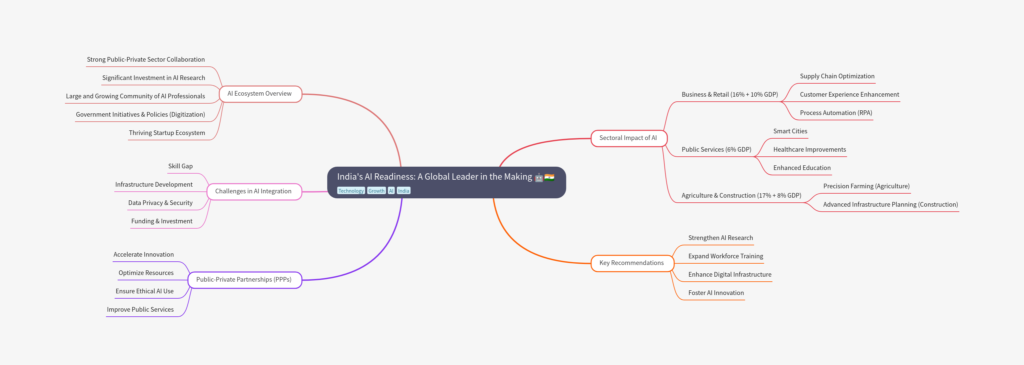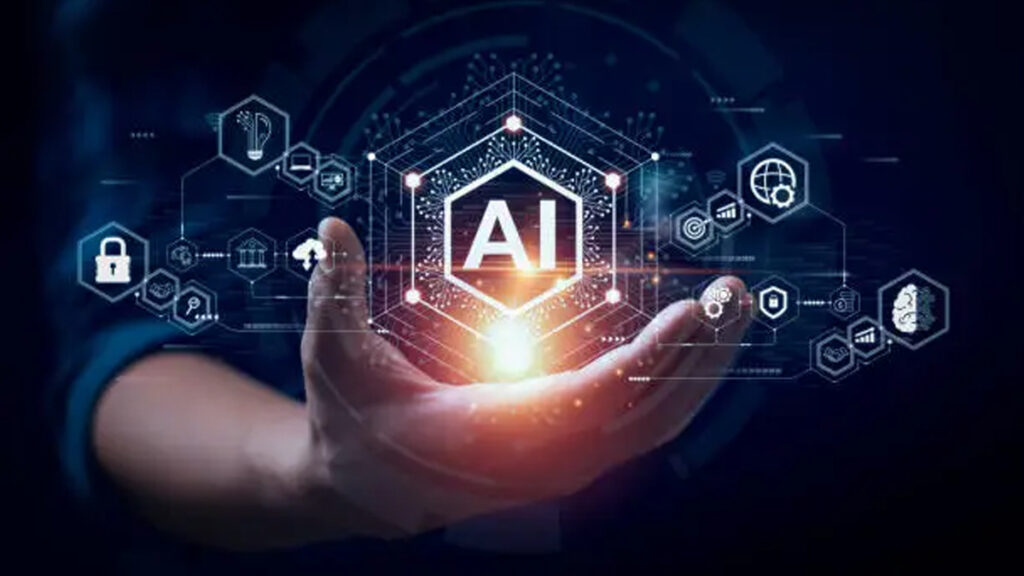Table of Contents

Introduction
India is on the brink of a technological transformation, emerging as a global leader in AI readiness. According to the recent Boston Consulting Group (BCG) report, which evaluated AI readiness in 73 countries, India stands second globally for the number of AI specialists and third for research publications in the field. These rankings highlight India’s growing potential in the AI landscape, reflecting an increased focus on integrating AI technologies across various sectors to drive growth, efficiency, and global competitiveness.
AI Ecosystem Overview in India
The global report by BCG highlights that while over 70% of countries are struggling with challenges such as ecosystem participation and skill development, India has demonstrated notable progress. This success can be attributed to India’s robust Artificial Intelligence ecosystem, which involves active participation from both the private and public sectors, investment in AI research, and a burgeoning community of AI professionals.
India’s focus on building an AI-ready ecosystem is apparent through its dedication to creating an enabling environment for research and development. With a tech-savvy workforce and strong academic backing, India has positioned itself as a hub for AI talent. Its universities and research institutions are increasingly collaborating with private industries to bridge the skill gap and fuel innovation.
The government has also been proactive in pushing AI integration across multiple domains. Policies aimed at digitization, combined with a thriving startup ecosystem, make India a fertile ground for AI advancements. However, the journey is not without its hurdles, as challenges in infrastructure and rural connectivity need to be addressed.
How AI Readiness in India is Impacting Different Sectors

Artificial Intelligence in Business and Retail
The business services sector, accounting for 16% of India’s GDP, is one of the primary beneficiaries of AI advancements. AI technologies are enabling businesses to automate operations, optimize workflows, and improve customer service through data-driven insights. In particular:
- Supply Chain Optimization: AI helps in predictive analytics to manage supply chain disruptions, inventory management, and demand forecasting.
- Customer Experience: AI-driven chatbots and personalized marketing strategies are enhancing customer engagement.
- Process Automation: Robotic Process Automation (RPA) is streamlining routine tasks, leading to increased productivity.
In the retail sector, contributing 10% to the GDP, AI is revolutionizing inventory management, enabling retailers to track consumer behavior, optimize pricing strategies, and reduce waste. AI-powered platforms can predict consumer trends, allowing retailers to make informed decisions.
Artificial Intelligence in Public Services
Public services, making up 6% of GDP, stand to gain significantly from AI integration. By harnessing AI, government bodies can improve service delivery, enhance transparency, and provide better support during emergencies. Key areas of impact include:
- Smart Cities: AI can play a pivotal role in traffic management, waste management, and utilities optimization.
- Healthcare: AI in public health can enable predictive diagnostics, improve patient outcomes, and streamline healthcare administration.
- Education: AI-powered platforms offer personalized learning experiences, ensuring that education reaches the remotest areas of India.
AI in Agriculture and Construction
The agricultural sector, contributing 17% of India’s GDP, is set to experience a transformation with the introduction of precision farming. This approach leverages AI to analyze data from soil, weather patterns, and crop health, leading to improved productivity and risk management.
In the construction sector, which contributes 8% of GDP, AI can be utilized for advanced infrastructure planning, predictive maintenance of buildings, and efficient project management. Automation of construction processes can lead to faster project execution with reduced costs.
Challenges in AI Integration
Despite the impressive strides, India faces several challenges in fully integrating AI across all sectors:
- Skill Gap: While India has a substantial pool of AI talent, the demand for AI specialists still outpaces supply. Bridging the skills gap, particularly in rural areas, remains crucial.
- Infrastructure Development: The need for robust digital infrastructure, especially in remote regions, is critical for successful AI adoption.
- Data Privacy and Security: Ensuring ethical AI use and preventing data breaches is a major concern. India’s regulatory framework needs to evolve to manage data privacy effectively.
- Funding and Investment: Significant investments in research, cloud computing, and AI-driven startups are necessary to sustain momentum.
Key Recommendations for AI Advancement
To harness the full potential of AI, the BCG report makes several strategic recommendations for India:
- Strengthen AI Research: Increasing funding for AI research and development can keep India at the forefront of innovation. Establishing specialized research hubs and innovation centers will foster collaboration between academia and industry.
- Expand Workforce Training: Focused training programs, especially in rural areas, are essential to creating a skilled workforce. Upskilling and reskilling initiatives should be prioritized.
- Enhance Digital Infrastructure: Investments in digital infrastructure, such as high-speed internet and cloud computing capabilities, are needed to support AI operations on a large scale.
- Foster AI Innovation: Incentives for startups and small businesses to develop AI-based solutions can drive innovation and ensure diverse AI applications.
The Role of Public-Private Partnerships
Public-Private Partnerships (PPPs) are critical for the advancement of AI in India. By combining resources from both sectors, PPPs can:
- Accelerate Innovation: Collaborative projects can lead to groundbreaking innovations in AI.
- Optimize Resources: Shared resources and funding can reduce the financial burden and risks associated with AI research and development.
- Ensure Ethical AI Use: With government oversight, ethical guidelines for AI can be established, ensuring fair and unbiased AI applications.
- Improve Public Services: PPPs can drive the deployment of AI in healthcare, education, and agriculture, enhancing service delivery.
Aparna Bharadwaj, a notable voice in the AI sector, emphasizes the need for policymakers to prepare for an AI-driven future by focusing on resilience, productivity, job creation, and maintaining global competitiveness.
Conclusion
India’s journey towards becoming a global AI leader is well underway. The country’s impressive ranking in AI readiness showcases its potential to transform various sectors through strategic AI integration. By addressing challenges, investing in infrastructure, and fostering public-private partnerships, India can solidify its position as a key player in the global AI landscape. Embracing AI will not only modernize India’s public services but also boost economic growth and enhance global competitiveness.
FAQs
Q1: What is AI readiness, and why is it important for India?
Ans: AI readiness refers to a country’s preparedness to adopt and implement AI technologies across various sectors. For India, AI readiness is crucial as it positions the country to leverage AI for economic growth, improved public services, and enhanced global competitiveness.
Q2: How can AI benefit the agriculture sector in India?
Ans: AI can revolutionize agriculture through precision farming. This includes using AI for data-driven decisions on crop management, soil health analysis, weather prediction, and pest control, ultimately improving productivity and reducing waste.
Q3: What role do public-private partnerships play in AI development?
Ans: Public-private partnerships are essential for pooling resources, sharing expertise, and accelerating AI innovation. They can also ensure ethical AI use, optimize resource allocation, and drive the modernization of public services.
Q4: What challenges does India face in AI integration?
Ans: Major challenges include a skills gap in AI professionals, insufficient digital infrastructure in rural areas, data privacy concerns, and the need for more funding in AI research and development.
Q5: What are the key sectors that AI is impacting in India?
Ans: AI is significantly impacting sectors like business services, retail, public services, agriculture, and construction. These sectors benefit from enhanced efficiency, productivity, and data-driven decision-making due to AI integration.
“Your writing style is engaging and clear, love it!”